SOCI committee briefing binder: Briefing Book for the Minister of Seniors
Official title: Standing Senate Committee on Social Affairs, Science and Technology (SOCI) February 25, 2022 study of Bill C-12, An Act to amend the Old Age Security Act (Guaranteed Income Supplement)
On this page
- 1. Minister’s Speech
- a) English
- 2. Scenario note
- 3. Clause-by-Clause Analysis
- 4. Bill Kit (as provided to Senators)
- a) Ministerial Message
- b) Backgrounder
- c) FAQ
- d) Copy of the Bill
- 5. SOCI Committee Member Bios
1. Speaking notes
Full title: Speaking notes for The Minister of Seniors Kamal Khera, for an appearance before the Senate Standing Committee of Social Affairs, Science and Technology on Bill C‑12: An Act to amend the Old Age Security Act (Guaranteed Income Supplement), Ottawa, Ontario, February 25, 2022
Check against delivery
Madam Chair,
I’d like to acknowledge that I am joining you from the traditional territory of the Mississaugas of New Credit.
Or
I’d like to acknowledge that I am joining you from the ancestral, traditional, unceded territory of the Algonquin Nation.
Thank you for inviting me today to answer your questions on Bill C-12 – and thank you, Committee members, for your study of this legislation. I’m confident your findings will help the Government of Canada strengthen the financial security of Canadian seniors.
I’ll use my time today to briefly explain why the Government of Canada tabled Bill C‑12, what it would do and why it’s important to pass this legislation quickly.
The last 2 years have forced us to continually adapt to a constantly changing reality. Bill C‑12 is another example of this.
As you know, the Government introduced pandemic benefits to support people who lost jobs during the pandemic.
The Canada Emergency Response Benefit – or CERB – and then, the Canada Recovery Benefit – or CRB – helped millions of Canadians avoid catastrophic income loss.
However, in the longer term, emergency benefits also affected the financial security of some Guaranteed Income Supplement – or GIS – and Allowance recipients.
The Income Tax Act defines pandemic relief benefits as taxable income. Therefore, some GIS and Allowance recipients saw their benefit payments decreased – or even stopped completely – because of the income they received from pandemic benefits.
To correct this situation, the Government of Canada proposed a 2-step solution.
First, the Government is providing up to $742.4 million for one-time payments to help alleviate the financial hardship of those affected. These payments will be issued in mid-April 2022, and my Department is also working hard to issue a small number of payments in March 2022 to seniors who are experiencing severe financial hardship.
Second, the Government tabled Bill C‑12 to make sure such a situation would not happen again.
That’s why the Government tabled Bill‑12: to make sure that seniors don’t face another loss or reduction in their GIS or Allowance benefits because they received emergency benefits.
Bill C‑12 would modify the Old Age Security Act to permanently exempt federal pandemic benefits from the calculation of GIS or Allowance benefits, beginning in July 2022.
To be clear, the following benefits would be exempt:
- the Canada Emergency Response Benefit, including any CERB amounts paid under the Employment Insurance Act;
- the Canada Recovery Benefit
- the Canada Recovery Sickness Benefit
- the Canada Recovery Caregiving Benefit and
- the Canada Worker Lockdown Benefit
That’s what Bill C‑12 would do.
Now, in order to exempt that income, and to prevent lower benefit payments to some GIS and Allowance recipients because of the income they received from these pandemic benefits, this legislation has to be passed by early March.
To be more precise, Bill C‑12 must receive Royal Assent by March 4 to guarantee that this takes effect as of July 1.
Every day thereafter causes immense challenges for the system, and will have an impact on seniors’ files.
That’s why it’s important to pass this legislation quickly.
We have a very short window of opportunity at a very busy time of the year. The Government is fully aware that the pressure is on Parliament, but this is the only way we can make the correction in time for July.
As I already said, the last 2 years have forced us to continually adapt to a constantly changing reality. Bill C‑12 is another example of this.
This legislation can help the Government of Canada better protect and strengthen the financial security of Canadian seniors.
I want to reiterate how appreciative the Government is of all the time and work that the Committee is putting into the study of this legislation.
The Government is looking forward to – and will pay close attention to – your findings.
I am now happy to answer any questions you may have.
Thank you for your time.
-30-
2. Scenario note
1. Overview
The Senate Standing Committee on Social Affairs, Science and Technology (SOCI) has invited you to appear before the committee to study Bill C-12, An Act to amend the Old Age Security Act (Guaranteed Income Supplement).
2. Committee proceedings
- The appearance is scheduled to take place on Friday, February 25, 2022, at 2:00 PM
- You will have up to 5 minutes for opening remarks
- The chair of the Committee, Senator Ratna Omidvar, will preside over the meeting
- Senate Committees do not have pre-established rounds of questioning and do not have a set limit on the number of minutes for each interventions
- At SOCI, the Chair will generally turn to the Deputy Chair Patricia Bovey for the first question. Subsequently, the Chair will recognize Senators interested to ask questions. The Chair may also use her privilege to ask questions
- Senator Donald Plett (CPC), Bill critic, may be present during the committee meeting; his office has been offered an individual technical briefing. Senator Jane Cordy, Bill sponsor, will likely be present
3. Parliamentary environment
Based on questions raised in the House of Commons during the consideration of the legislation and at briefings offered to parliamentarians, you may expect the following comments or questions at the appearance:
- timing of the legislation: why introduce the legislation in February with a requirement to adopt it by March 4, 2022, considering the issue has been well documented by media and raised by parliamentarians since June 2021. Why did it take so long for the Government to act and help the most vulnerable?
- critical timelines to pass the legislation: MPs and Senators have requested clarification why the Bill is urgent, considering the GIS payment cycle begins on July 1st. The reasons will likely need to be restated
- IT considerations: questions related to ongoing issues with legacy systems. This issue has been raised previously. On May 13, 2021, at SOCI, it was highlighted that the $500 one-time OAS payment to seniors in August 2021 was an interim measure to get to the full implementation scheduled in 2022, because of the time to change the administration of the program and to implement this change through the systems
- impacts on OAS: During the technical briefing held on February 17, 2022, Senator Dennis Patterson asked a series of questions relating mostly to OAS, if the one-time $500 payment from 2020 was included in this Bill, and why those on OAS were not covered in this Bill
- provincial benefits: At that same briefing, Senator Pamela Wallin asked questions on the impact this legislation could have on provincial benefits. Senator Frances Lankin is a former Ontario cabinet minister and might have an interest in following up on this topic. Further, Senator Bovey has previously taken an interest about the GIS and how it relates to provinces, and whether ESDC has discussions with provinces
- Senate considerations: Senators have been frustrated about the expectation the Senate would adopt “emergency legislation” by expediting the legislative process, and not allowing for proper examination. CPC SOCI member Senator Yonah Martin and the Bill critic Senator Donald Plett have raised this concern in the past and may even comment on the House of Commons’ motion to expedite the Bill in that Chamber. Further, Senator Plett may attend the meeting in his role of critic
- SOCI Senators could revisit testimony heard at a SOCI meeting in May 2021. The Committee studied Bill C-30, Budget Implementation Act, No. 1, 2021, Division 32, related to the OAS 10% increase for those 75 years and over. SOCI members were critical of the proposal and indicated the Minister should have appeared to answer sensitive policy questions. Specifically, they questioned why the Government opted to increase the OAS for Canadians 75 and over instead of choosing to increase the Guaranteed Income Supplement for seniors, which targets the most vulnerable seniors. Questions raised at SOCI are below:
SOCI member
Ratna Omidvar (ISG)
Previous questions on OAS/GIS
I would really like to ask your political masters about the policy rationale, I want to ask you about people in need. What percentage of OAS recipients receive the GIS? Those are the people in need.
SOCI member
Patricia Bovey (PSG)
Previous questions on OAS/GIS
On increasing the OAS for Canadians aged 75 plus: Provide statistics and analysis regarding whom the benefit will really aid? Will it help those who are really in need or may not be benefiting from it sufficiently? Why 75? Why 10%? Did you consult, do you have data? Why take an age rather than the personal circumstances of individuals, which the GIS would allow you to do?
We’ve heard of actuarial scientists taking a look at statistics, we’re aware of some of the statistics, we’ve voiced concerns about those in need for the GIS and you’ve talked about doing further analysis with other information. Is some of that information provincial in nature? Have there been discussions with provinces?
SOCI member
Donna Dasko (ISG)
Previous questions on OAS/GIS
Do you have data that shows that the cost of living for the over-75 group has gone up by 10%?
SOCI member
Stan Kutcher (ISG)
Previous questions on OAS/GIS
How helpful is this going to be for our most vulnerable people, this 10% increase? The poverty line. What is that line? A 10% increase, is that going to lift many Canadians over the poverty line? I would love to see that data.
SOCI member
Rosemarie Moodie (ISG)
Previous questions on OAS/GIS
Do you have statistics on women, individuals with disabilities, seniors who live in rural areas, Indigenous seniors or Black seniors? Do you collect disaggregated data to you to help you in your policy-making decisions?
SOCI member
Donald Plett (CPC, non-member) (Critic - Bill C-12)
Previous questions on OAS/GIS
Third Reading in the Senate: If you are trying to help those seniors who need it most, why would you not spend the money on increasing the Guaranteed Income Supplement, which goes directly to low-income seniors rather than increasing the Old Age Security, which is a universal benefit for all seniors regardless of their income? Increasing OAS to those aged 75 and over is another example of an instrument designed for political ends rather than public good.
3. Clause-By-Clause
An Act To Amend The Old Age Security Act (Guaranteed Income Supplement)
Clause 1
This clause amends the definition of “income” in section 2 of the Old Age Security Act to specify that, when determining the amount of a Guaranteed Income Supplement or Allowance payable in respect of a month after June 2022, any amount of Canada Emergency Response Benefit, Employment Insurance Emergency Response Benefit, Canada Recovery Benefit, Canada Recovery Sickness Benefit, Canada Recovery Caregiving Benefit and Canada Worker Lockdown Benefit shall be deducted from the person’s income.
4. Bill Kit (header not included in original binder)
a) Minister Khera’s message on Bill C-12 (header not included in original binder)
To Members of Parliament and Senators
We are pleased to announce that the Government tabled Bill C-XX, An Act to amend the Old Age Security Act (Guaranteed Income Supplement), today in the House of Commons.
The Bill is intended to support Guaranteed Income Supplement (GIS) and Allowance recipients who may be facing lower benefit payments because of the income they received from pandemic benefits.
Pandemic benefits were intended to support people who lost their job during the pandemic. However, the Government recognizes that some GIS and Allowance recipients may be facing lower benefit payments because of the income they received from these pandemic benefits.
In order to ensure that this issue does not recur, this bill will amend the Old Age Security Act to exclude any income received under the Canada Emergency Response Benefit, the Canada Recovery Benefit, the Canada Worker Lockdown Benefit, the Canada Recovery Sickness Benefit, and the Canada Recovery Caregiving Benefit, for the purposes of calculating the amount of GIS and Allowance payable beginning in July 2022.
These amendments would prevent seniors who received pandemic benefits in 2021 or later from experiencing a loss or reduction in their future GIS/Allowance benefits.
Kamal Khera
Minister of Seniors
b) Backgrounder: Legislation to support low-income seniors who received pandemic benefits
On February XX, the Government of Canada introduced Bill C-XX to amend the Old Age Security Act to exempt pandemic benefits from the calculation of Guaranteed Income Supplement (GIS) or Allowance benefits, beginning in July 2022.
The GIS is an income-tested benefit payable to low-income seniors who receive the Old Age Security pension. The Allowances are income-tested benefits payable to 60- to 64-year-olds who are the spouses/common-law partners of GIS recipients, or who are widows/widowers.
Pandemic benefits, such as the Canada Emergency Response Benefit and the Canada Recovery Benefit, were intended to support people who lost their job during the pandemic. However, as these benefits are defined as taxable income under the Income Tax Act, they are also considered as income when determining entitlement to the GIS and Allowance benefits.
The Government of Canada recognizes that some GIS and Allowance recipients may face lower benefit payments because of the income they receive from these pandemic benefits.
As a first step toward resolving this issue, the Government will provide up to $742.4 million for one-time payments to alleviate the financial hardship on GIS and Allowance recipients who received the pandemic relief benefits in 2020, and who faced a reduction or loss of GIS/Allowance benefits in July 2021. Seniors would not need to take any action to receive the one-time payment.
In order to ensure that this issue does not recur, this bill proposes to exempt any amount of Canada Emergency Response Benefit (including amounts paid under the Employment Insurance Act), Canada Recovery Benefit, Canada Recovery Sickness Benefit, Canada Recovery Caregiving Benefit and Canada Worker Lockdown Benefit from the calculation of income for GIS/Allowance purposes in future years. These amendments would prevent GIS/Allowance recipients who received pandemic benefits in 2021 or later from experiencing a loss or reduction in their future benefits.
c) Frequently asked questions
An Act to Amend the Old Age Security Act (Guaranteed Income Supplement)
Legislative Amendment
Q1. How will the amendment to the Old Age Security Act help low-income seniors who were in receipt of pandemic benefits in 2021?
A1. The Canada Emergency Response Benefit (CERB), the Canada Recovery Benefit (CRB), the Canada Recovery Sickness Benefit (CRSB), the Canada Recovery Caregiving Benefit (CRCB) and the Canada Worker Lockdown Benefit (CWLB) were designed to provide financial support to employed and self-employed Canadians directly affected by COVID-19.
However, as these pandemic benefits are defined as taxable income under the Income Tax Act, they are also considered as income when determining entitlement to the Guaranteed Income Supplement (GIS) and the Allowances.
The Government of Canada recognizes that some GIS and Allowance recipients may face lower benefit payments as a result of the income they receive from these pandemic benefits.
In order to ensure that low-income seniors do not face a loss or reduction in their GIS or Allowance in the coming years, the Government is introducing amendments to the Old Age Security Act which will exempt these pandemic benefits from the calculation of income for GIS and Allowance, beginning in July 2022.
Q2. Why did you decide to introduce legislation instead of another payment?
A2. In order to ensure that pandemic benefits will not affect GIS/Allowance entitlement in future payment periods, the Government is proposing these legislative amendments to exempt the CERB, CRB, CRCB, CRSB and CWLB from the GIS and Allowance calculations in future years.
These amendments will ensure that seniors do not face a reduction of their GIS/Allowance benefits in July 2022 (or in future years) and will ensure that vulnerable seniors receive the benefits to which they are entitled.
Q3. Which pandemic benefits will be exempt from the calculation of income for the GIS and the Allowances?
A3. Beginning in July 2022, these amendments would exempt the following benefits from the calculation of income for GIS and Allowance purposes:
- the Canada Emergency Response Benefit, including those paid under the Employment Insurance Act
- the Canada Recovery Benefit
- the Canada Recovery Sickness Benefit
- the Canada Recovery Caregiving Benefit, and
- the Canada Worker Lockdown Benefit
Q4. What about low-income seniors who will receive pandemic benefits in 2022 and beyond?
A4. In order to mitigate the impact of pandemic benefits on the GIS/Allowances in future years, this exemption would include the Canada Worker Lockdown Benefit, which is being paid in 2022. The measure will also include any amount of Canada Recovery Sickness Benefit and Canada Recovery Caregiving Benefit that a person may receive in 2022.
One-time payment
Q5. What is the Government doing to help low-income seniors who lost their GIS in July 2021 because they received pandemic benefits in 2020?
A5. The Government is moving quickly to provide up to $742.4 million for one-time payments to alleviate the financial hardship of GIS and Allowance recipients who received the Canada Emergency Response Benefit or the Canada Recovery Benefit in 2020.
This automatic, one-time payment will support those who saw a loss of GIS or Allowance by compensating them for the full, annualized loss amount.
Up to 204,000 individuals could be eligible to benefit from this one-time payment. The targeted, one-time payment is proposed to go to an estimated 183,000 GIS recipients and 21,000 Allowance recipients who received CERB/CRB in 2020, and who faced a reduction or loss of GIS benefits in July 2021.
Q6. Will seniors need to apply to receive this one-time payment?
A6: No. Seniors will not need to take any action. GIS recipients who received CERB or CRB in 2020 and who faced a reduction or loss of GIS benefits in July 2021 will automatically receive the one-time payment.
Q7. Will this payment be taxable?
A7. No, the payment will not be taxable.
Q8. Why is this one-time payment only being offered to seniors who received GIS in 2020 and not all seniors?
A8. Pandemic benefits such as the CERB or CRB were intended to offer support to people who lost their job during the pandemic, not to cause further financial hardship to GIS recipients.
Q9. How much will the proposed payment amount be and when will it be issued?
A9. The amount of the one-time payment will vary, as it will compensate each individual for their loss of GIS/Allowance benefits. Further details on the calculation and distribution of the proposed one-time payment will be announced shortly.
Q10. What action has the Government taken to support seniors?
A10. The Government has taken significant actions to support including:
- restoring the age of eligibility for the OAS pension and the GIS to 65 from 67
- strengthening the Canada Pension Plan for future retirees
- increasing the GIS for single seniors and raising the GIS earnings exemption
- providing a one-time tax-free payment of $300 for single seniors and $500 for couples to help seniors with their extra costs during the pandemic
- in April 2020, more than 4 million low- and middle-income seniors received a GST credit top-up—worth an average of $375 for individual seniors and $510 for senior couples
- reducing income taxes through increases to the Basic Personal Amount
- supporting seniors so they can live in their homes for longer as they age by committing to provide $90 million for the Age Well at Home initiative
- in March 2020 we invested an additional $9 million via the New Horizons for Seniors Program to support projects by community organizations serving seniors
- in May 2020 we invested a further $20 million to expand the New Horizons for Seniors Program to support organizations that offer community-based projects that reduce isolation, improve the quality of life of seniors, and help them maintain a social support network
- and, moving forward with the plan to boost the OAS by 10% next year for seniors 75 and over to help address the financial vulnerability that older seniors may face
d) Copy Bill C-12
5. Members of the Senate Committee on Social Affairs, Science and Technology – Biographies
Ratna Omidvar – CHAIR Independent Senators Group Province: Ontario
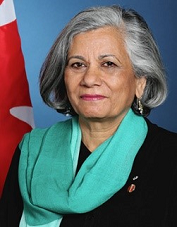
Biography
In April 2016, Prime Minister Trudeau appointed Ms. Omidvar to the Senate of Canada as an independent Senator representing Ontario. As a member of the Senate’s Independent Senators Group she holds a leadership position as the Scroll Manager. Ratna Omidvar is an internationally recognized voice on migration, diversity and inclusion. She came to Canada from Iran in 1981 and her own experiences of displacement, integration and citizen engagement have been the foundation of her work.
Senator Omidvar is the founding Executive Director and currently a Distinguished Visiting Professor at the Global Diversity Exchange (GDX), Ted Rogers School of Management, Ryerson University. GDX is a think-and-do tank on diversity, migration and inclusion that connects local experience and ideas with global networks. It is dedicated to building a community of international leaders who see prosperity in migration. Previously, Senator Omidvar was the President of Maytree, where she played a lead role in local, national and international efforts to promote the integration of immigrants.
Senator Omidvar is the current Co-Chair of the Global Future Council on Migration hosted by the World Economic Forum and serves as a Councillor on the World Refugee Council. She is also a director at the Environics Institute, and Samara Canada and is the Toronto Region Immigrant Employment Council’s Chair Emerita and was formerly the Chair of Lifeline Syria.
Senator Omidvar is co-author of Flight and Freedom: Stories of Escape to Canada (2015), an Open Book Toronto best book of 2015 and one of the Toronto Star's top 5 good reads from Word on the Street. She is also a contributor to The Harper Factor (2016) and co-editor of Five Good Ideas: Practical Strategies for Non-Profit Success (2011). Senator Omidvar received an Honorary Degree, Doctor of Laws, York University in 2012.
Senator Omidvar has also been recognized by Canada's national newspaper, The Globe and Mail, by being named as its Nation Builder of the Decade for Citizenship in 2010. She was named to the inaugural Global Diversity List sponsored by The Economist magazine in 2015, as one of the Top 10 Diversity Champions worldwide. In 2016, she also received Lifetime Achievement Awards from CivicAction and the Canadian Urban Institute, honouring her strong commitment to civic leadership and city building.
Donna Dasko Independent Senators Group Province: Ontario
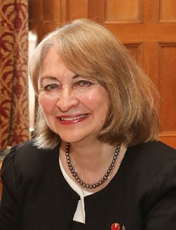
Biography
The Honourable Donna Dasko was appointed to the Senate of Canada on June 6th, 2018 by Prime Minister Justin Trudeau. Formerly a national pollster, media commentator and private sector business leader, Senator Dasko also holds a Ph.D and MA from the University of Toronto as well as a BA (Hons) from the University of Manitoba.
Prior to being appointed as a Senator for Ontario, Senator Dasko was Senior Vice-President of Environics Research Group Ltd, a leading research firm in Canada. She has volunteered in many roles including as Chair of the National CEO Roundtable for the Alzheimer Society, and Advisor to GreenPac (which promotes environmental leadership).
Dr. Dasko’s passion for the promotion of women in politics has guided much of her advocacy. She is a Co-Founder and former National Chair of Equal Voice, a non-partisan organization aimed at electing more women in Canada. She currently serves on the Board of Directors of Women’s Legal Education and Action Fund (LEAF), which promotes equality rights for women. In 2015, she co-founded the Campaign for an Equal Senate for Canada, an initiative to promote a gender-equal Senate. She works with the National Democratic Institute on issues related to women in politics internationally.
Yonah Martin Conservative Party of Canada Province: British Columbia

Biography
The Honourable Yonah Martin (born April 11, 1965) is a Conservative Senator from British Columbia, appointed by The Right Hon. Stephen Harper in 2009. She is the first Canadian of Korean descent to serve in the Senate of Canada and the first Korean-Canadian parliamentarian in Canadian history.
Senator Martin is currently the Deputy Leader of the Opposition in the Senate (since November 2015). She previously served as the Deputy Leader of the Government in the Senate (2013 to 2015); and as the Deputy Whip of the Government (2011 to 2013). She has been Co-Chair of the Canada Korea Inter-Parliamentary Group since 2009; and Chairs or serves on the Executive of various interparliamentary groups. In November 2015, she co-founded International Parliamentary Coalition for Victims of Sexual Slavery (IPCVSS), and currently serves as Co-Chair of Canada.
Her notable achievements as a Senator to date include the enactment of her Senate Public Bill - Korean War Veterans Day Act (June 2013); the successful campaign to add TCM and Acupuncturists to the schedule of health professionals for GST/HST exemption (April 2014); and the conclusion of a multi-year negotiation process and implementation of the historic Canada Korea FTA (January 2016).
In recognition of her community service in the Tri-Cities region, Yonah Martin was awarded the 2004 Spirit of Community Award for Cultural Harmony. In 2009, she was awarded the Order of Civil Merit Moran Medal by the president of the Republic of Korea for outstanding leadership and work in advancing the rights of overseas Koreans; and in 2012, the Queen Elizabeth II Diamond Jubilee Medal by Governor General David Johnston. In 2014, as part of UBC's centennial campaign, she was recognized as one of University of British Columbia's top Education 100 Alumni; and in February 2016, she was honoured with the King Clancy Award from the Canadian Foundation for Physically Disabled Persons (CFPDP). Most recently, Yonah Martin was among 100 Canadians to be featured (for 1965, her birth year) in MacLean's special Canada Day issue of "Canada's Stories", to mark the magazine's 100th anniversary.
Dennis Glen Patterson Canadian Senators Group Province: Nunavut

Biography
Dennis Patterson (Nunavut) is a former Premier of the Northwest Territories who has dedicated his career to bettering the lives of people throughout Canada’s North.
In his distinguished 16-year career as a member of the Legislative Assembly in the Northwest Territories Mr. Patterson served in many capacities including Minister of Education, Minister of Health and Social Services and Minister of Justice, culminating in his service as Premier between 1987 and 1991.
During his time in public office Mr. Patterson played a key role in the settlement of the Inuvialuit final agreement and the Nunavut final land claim agreement. Mr. Patterson also served as a leader of the more than twenty-year campaign which led to the establishment of Nunavut as Canada’s newest territory in 1999. Prior to entering politics, Mr. Patterson practiced law and was appointed founding Executive Director of the Legal Services Centre, Maliiganik Tukisiiniakvik Society, in Iqaluit.
After serving as Premier, Mr. Patterson established a private consulting firm, was admitted to the Law Society of Nunavut in 2001 and since 2003 has been a Trustee and, until September, 2015, was the Chair of Governance, Compensation and Nomination Committee of the Northern Property Real Estate Investment Trust.
Frances Lankin Independent Senators Group Province: Ontario
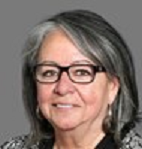
Biography
Frances Lankin has been a lifelong advocate for workers’ and women’s rights.
Lankin served for 11 years in the Legislative Assembly of Ontario (1990 to 2001), holding the positions of Minister of Government Services and Chair of Management Board, Minister of Health and Long Term Care and Minister of Economic Development and Trade. She also spent more than 10 years as the CEO of United Way Toronto.
She has contributed to a number of diverse government bodies and initiatives, including as a Member of the Security Intelligence Review Committee, Co-Chair of the Blue Ribbon Committee on Federal Grants and Contributions, Co-Commissioner of the Commission for the Reform of Social Assistance in Ontario, and Member of the Premier’s Advisory Council on Government Business Assets.
Lankin has served on several Crown, not-for-profit, charitable and corporate boards, including those of Equal Voice, The Canadian Foundation for Economic Education, the Toronto City Summit Alliance, the University of Toronto's School of Public Policy Advisory Committee, the Board of the Ontario Hospital Association, the Board of the Literary Review of Canada, the Mowat Centre’s Advisory Committee, the National NewsMedia Council, the Ontario Press Council, the Institute of Corporate Directors, Metrolinx, Hydro One and the Ontario Lottery and Gaming Corporation.
Lankin is a Member of Privy Council and a Member of the Order of Canada.
She has received Honorary Doctorates from Queen’s University, Ryerson University, the University of Windsor, and Nipissing University and is a recipient of the Queen’s Golden Jubilee and Queen’s Diamond Jubilee Medals. She is also the recipient of numerous awards and recognitions for her community work and involvement in the charitable sector.
Lankin was appointed to the Senate on March 18, 2016. She is a member of the National Security and Intelligence Committee of Parliamentarians.
Stan Kutcher Independent Senators Group Province: Nova Scotia

Biography
Appointed to the Senate in December of 2018 by Prime Minister Justin Trudeau, Senator Kutcher is a leading psychiatrist and professor who has helped young people successfully manage major mental illnesses. Dr. Kutcher studied history and political science before earning a medical degree from McMaster University. He continued his education in Toronto and in Edinburgh, Scotland before returning to Canada and joining the University of Toronto.
It was there that he made his first of many major contributions to Canadian health care, taking Sunnybrook Hospital’s adolescent psychiatry division and transforming it into an innovative clinical and research facility. He also pioneered research into the causes of and treatments for youth with major mental illnesses such as bipolar illness, schizophrenia and depression.
Dr. Kutcher then became Head of the Psychiatry Department at Dalhousie University followed by appointments as Associate Dean for International Heath and the Sun Life Financial Chair in Adolescent Mental Health.
In addition to his professional practice, Dr. Kutcher has served on the board of the Art Gallery of Nova Scotia and the board of the Spryfield Boys and Girls Club. He also led the development of a national youth mental health framework for Canada as a member of the Child and Youth Advisory Committee of the Mental Health Commission of Canada.
Dr. Kutcher has also received numerous awards and honours for his work, including the Order of Nova Scotia, the Canadian Academy of Child and Adolescent Psychiatry’s Naomi Rae-Grant and Paul D. Steinhauer Advocacy awards, the McMaster University Distinguished Alumni Award and the Association of Faculties of Medicine of Canada’s John Ruedy Award for Innovation in Medical Education.
Patricia Bovey – Deputy Chair Progressive Senate Group Province: Manitoba
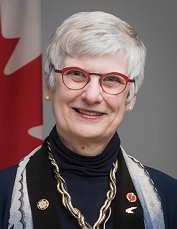
Biography
Senator Patricia Bovey was appointed to the Senate by Prime Minister Justin Trudeau on November 10, 2016. Prior to being appointed to the Senate, Senator Bovey was a Winnipeg-based gallery director and curator, art historian, writer, professor and, for many years, a management consultant in the arts and not-for-profit sector.
Former Chair of the Board of Governors of the University of Manitoba, she has served on the Boards of the National Gallery of Canada (2005 to 2009) and the Canada Council for the Arts (1990 to1993); the 1986 Withrow/Richard Federal Task Force on National and Regional Museums; the National Board for the Canadian Center for Cultural Management at the University of Waterloo (2002 to 2010); is a past Chair of the Board of Governors of Emily Carr University and of the Canadian Art Museum Directors Organization. She was a member of the Public Art Committee of the City of Winnipeg (2003 to 2007), and of the Mayor’s Task Force on Public Art to develop Winnipeg’s Public Art Policy (2002 to 2003). Former member of the Board of the University of Manitoba Press, she presently serves on the Eckhardt-Gramatté Foundation. She served as Board Chair of the Centre for Contemporary Canadian Art, and was a member of the Pierre Elliott Trudeau Foundation; the Manitoba Rhodes Scholarship and Loran Scholarship Selection committees; the board of Manitoba Artists in Healthcare and the Manitoba Chamber Orchestra.
Senator Bovey was a recipient of the 2015 Winnipeg Arts Council Investors Making a Difference Award, Senator Bovey’s honours include her appointment as Fellow of the UK’s Royal Society for the Arts, and as Fellow of the Canadian Museums Association; the Canada 125 Medal; the Queen’s Golden Jubilee Medal; Winnipeg’s 2002 Woman of Distinction for the Arts; the Canadian Museums Association Distinguished Service Award; the Royal Canadian Academy of Arts Medal; and the 2013 Association of Manitoba Museum’s inaugural Award of Merit.
Bovey’s consulting since 2005 has focused on governance, policy development and strategic and business planning for galleries, museums and multi-disciplinary arts organizations.
Chantal Petitclerc Independent Senators Group Province: Quebec

Biography
The Honourable Chantal Petitclerc is not only an internationally renowned athlete, but also a compassionate person. When she was 13 years old, she lost the use of her legs in an accident. While Petitclerc was developing her skills as a wheelchair athlete, she pursued her studies, first in social sciences at the CEGEP de Sainte-Foy and then in history at the University of Alberta in Edmonton. She overcame adversity and many obstacles to become a proven leader in the sports world. Her gold medals in the Paralympic Games, Olympic Games and Commonwealth Games, the various awards and accolades she has received, and her appointment as Team Canada’s Chef de Mission for the Rio Paralympic Games are all markers of her success.
Her many achievements and her personal journey have also made her an in-demand public speaker, recognized across Canada. She has been the spokesperson for Défi sportif AlterGo for 17 years, and is an ambassador for the international organization Right to Play. A tireless advocate for the contributions people with disabilities have made to our society, she plays a definitive role in building a more inclusive society. Her example inspires people to overcome their obstacles and achieve their full potential.
Through her experiences, Senator Petitclerc has also learned a lot about the particular characteristics of various communities, as well as how decisions are made at the national level. As someone who has functional limitations herself, she has a good understanding of the needs of various minority communities and would like to ensure their voices are heard. The Senator is a Companion of the Order of Canada and a Knight of the Order of Quebec. She received the Lou Marsh Trophy for Canadian Athlete of the Year and was inducted into the Canadian Paralympic Hall of Fame. She has also received 4 honorary doctorates. In addition, Senator Petitclerc sits on various committees and boards of directors, where she provides her dynamic and unique perspective.
Rosemary Moodie Independent Senators Group Province: Ontario
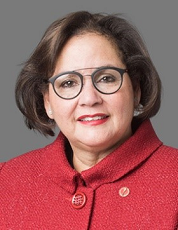
Biography
Appointed to the Senate in December 2018 by Prime Minister Justin Trudeau, Senator Moodie is a Jamaican-born paediatrician and neonatologist. After graduating from the University of the West Indies, she completed postgraduate training in Paediatric and Neonatal/Perinatal Medicine at Hospital for Sick Children in Toronto.
She is senior neonatologist, clinical teacher and associate professor in the Department of Paediatrics at the University of Toronto. She is Fellow of Royal College of Physicians of Canada and Fellow of American Academy of Pediatrics. Her research has focused on the social determinants of breastfeeding practice and she has written extensively on regional health services and physician human resource planning.
Senator Moodie is a well-recognized national and international medical leader. She has supported organizations and stakeholders in policy development and advocacy to improve health equity and expand quality health care access to the most vulnerable, underserved and marginalized population. Her work included Corporate Chief of Paediatrics and Medical Director of the Regional Maternal Child Program Rouge Valley Health System; Maternal, Child, Youth, and Gynaecology Lead for Central East Local Health Integration Network; and regional and provincial committees, such as the Child Health Network and Provincial Council of Children’s Health. Her expertise also includes health care planning locally and internationally.
Further, Senator Moodie is an Accreditation Canada hospital surveyor with extensive experience improving the quality of health care delivery across Canada and worldwide.
Senator Moodie has been a strong advocate for woman and girls. Her contributions to reducing social inequities and health disparities among children and communities have been significant. She is on the Board of Directors for the inaugural board of Providence Healthcare, St. Joseph’s Health Centre, and St. Michael’s Hospital (Unity Health Toronto) and the ScotiaBank Jamaica Foundation.
Wanda Thomas Bernard Progressive Senate Group Province: Nova Scotia
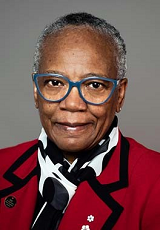
Biography
Dr. Wanda Thomas Bernard is a highly regarded social worker, educator, researcher, community activist and advocate of social change. She has worked in mental health at the provincial level, in rural community practice at the municipal level, and, since 1990, as a professor at the Dalhousie School of Social Work, where she also served as director for a decade.
In 2016, she was appointed Special Advisor on Diversity and Inclusiveness at Dalhousie University and she is the first African Nova Scotian to hold a tenure track position at Dalhousie University and to be promoted to full professor. Dr. Thomas Bernard has worked with provincial organizations to bring diversity to the political processes in Nova Scotia and teach community members about Canada’s legislative process and citizen engagement. She is a founding member of the Association of Black Social Workers (ABSW) which helps address the needs of marginalized citizens, especially those of African descent.
As a former member of the Nova Scotia Advisory Council on the Status of Women, and as its past Chair, was instrumental in the development of advice to ministers regarding frameworks for gender violence prevention and health equity. At the national level, she has served as a member of the National Coalition of Advisory Councils on the Status of Women. She has served as an expert witness in human rights cases and has presented at many local, national and international forums.
Dr. Thomas Bernard has received many honours for her work and community leadership, notably the Order of Nova Scotia and the Order of Canada.
Josée Verner Canadian Senators Group Province: Quebec
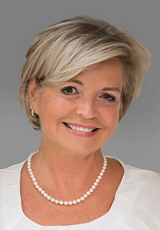
Biography
Josée Verner was first elected as a Member of Parliament in 2006 and re-elected in 2008. In February 2006, Ms. Verner was appointed Minister of International Cooperation and Minister for La Francophonie and Official Languages. In August 2007, she was named Minister of Canadian Heritage, Status of Women and Official Languages. In addition in May 2008, she was re-appointed Minister for La Francophonie.
In October 2008, she was named minister of Intergovernmental Affairs, President of the Privy Council for the Queen of Canada, Minister for La Francophonie as well as Minister responsible for the region of Quebec.
In June 2011, she was appointed to the Senate of Canada.
Ms. Verner has spent close to 20 years in communications and the public service.